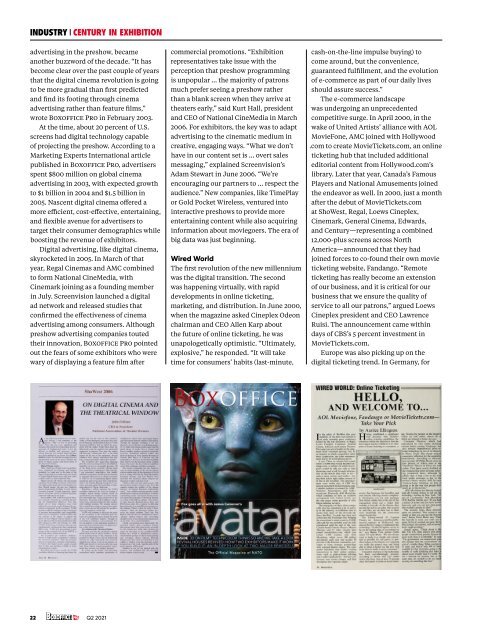Boxoffice Pro
Boxoffice Pro is the official publication of the National Association of Theatre Owners.
Boxoffice Pro is the official publication of the National Association of Theatre Owners.
You also want an ePaper? Increase the reach of your titles
YUMPU automatically turns print PDFs into web optimized ePapers that Google loves.
INDUSTRY CENTURY IN EXHIBITION<br />
advertising in the preshow, became<br />
another buzzword of the decade. “It has<br />
become clear over the past couple of years<br />
that the digital cinema revolution is going<br />
to be more gradual than first predicted<br />
and find its footing through cinema<br />
advertising rather than feature films,”<br />
wrote <strong>Boxoffice</strong> <strong>Pro</strong> in February 2003.<br />
At the time, about 20 percent of U.S.<br />
screens had digital technology capable<br />
of projecting the preshow. According to a<br />
Marketing Experts International article<br />
published in <strong>Boxoffice</strong> <strong>Pro</strong>, advertisers<br />
spent $800 million on global cinema<br />
advertising in 2003, with expected growth<br />
to $1 billion in 2004 and $1.5 billion in<br />
2005. Nascent digital cinema offered a<br />
more efficient, cost-effective, entertaining,<br />
and flexible avenue for advertisers to<br />
target their consumer demographics while<br />
boosting the revenue of exhibitors.<br />
Digital advertising, like digital cinema,<br />
skyrocketed in 2005. In March of that<br />
year, Regal Cinemas and AMC combined<br />
to form National CineMedia, with<br />
Cinemark joining as a founding member<br />
in July. Screenvision launched a digital<br />
ad network and released studies that<br />
confirmed the effectiveness of cinema<br />
advertising among consumers. Although<br />
preshow advertising companies touted<br />
their innovation, <strong>Boxoffice</strong> <strong>Pro</strong> pointed<br />
out the fears of some exhibitors who were<br />
wary of displaying a feature film after<br />
commercial promotions. “Exhibition<br />
representatives take issue with the<br />
perception that preshow programming<br />
is unpopular … the majority of patrons<br />
much prefer seeing a preshow rather<br />
than a blank screen when they arrive at<br />
theaters early,” said Kurt Hall, president<br />
and CEO of National CineMedia in March<br />
2006. For exhibitors, the key was to adapt<br />
advertising to the cinematic medium in<br />
creative, engaging ways. “What we don’t<br />
have in our content set is … overt sales<br />
messaging,” explained Screenvision’s<br />
Adam Stewart in June 2006. “We’re<br />
encouraging our partners to … respect the<br />
audience.” New companies, like TimePlay<br />
or Gold Pocket Wireless, ventured into<br />
interactive preshows to provide more<br />
entertaining content while also acquiring<br />
information about moviegoers. The era of<br />
big data was just beginning.<br />
Wired World<br />
The first revolution of the new millennium<br />
was the digital transition. The second<br />
was happening virtually, with rapid<br />
developments in online ticketing,<br />
marketing, and distribution. In June 2000,<br />
when the magazine asked Cineplex Odeon<br />
chairman and CEO Allen Karp about<br />
the future of online ticketing, he was<br />
unapologetically optimistic. “Ultimately,<br />
explosive,” he responded. “It will take<br />
time for consumers’ habits (last-minute,<br />
cash-on-the-line impulse buying) to<br />
come around, but the convenience,<br />
guaranteed fulfillment, and the evolution<br />
of e-commerce as part of our daily lives<br />
should assure success.”<br />
The e-commerce landscape<br />
was undergoing an unprecedented<br />
competitive surge. In April 2000, in the<br />
wake of United Artists’ alliance with AOL<br />
MovieFone, AMC joined with Hollywood<br />
.com to create MovieTickets.com, an online<br />
ticketing hub that included additional<br />
editorial content from Hollywood.com’s<br />
library. Later that year, Canada’s Famous<br />
Players and National Amusements joined<br />
the endeavor as well. In 2000, just a month<br />
after the debut of MovieTickets.com<br />
at ShoWest, Regal, Loews Cineplex,<br />
Cinemark, General Cinema, Edwards,<br />
and Century—representing a combined<br />
12,000-plus screens across North<br />
America—announced that they had<br />
joined forces to co-found their own movie<br />
ticketing website, Fandango. “Remote<br />
ticketing has really become an extension<br />
of our business, and it is critical for our<br />
business that we ensure the quality of<br />
service to all our patrons,” argued Loews<br />
Cineplex president and CEO Lawrence<br />
Ruisi. The announcement came within<br />
days of CBS’s 5 percent investment in<br />
MovieTickets.com.<br />
Europe was also picking up on the<br />
digital ticketing trend. In Germany, for<br />
22 Q2 2021

















